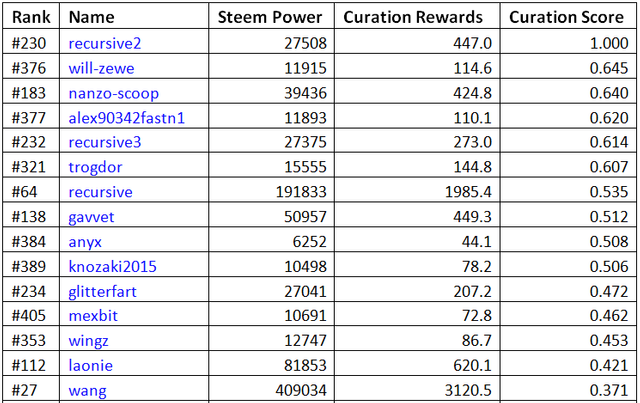Beat the BOTS: The Evolution of Curation
The bots are evolving... the curation market is getting more efficient. In this article I'll discuss some observations I've had whilst digging deeper in curation and what I see potentially developing in the future. It's great news for undiscovered, quality writers.
When looking at the big picture of Steemit and the implications for the future potential and growth of the system a couple of hurdles struck me....
...Firstly, If larger investors get involved then one of the reasons would be for potential curation revenue, I had to dig a little deeper to see how it all worked and if this would incentivize investment in Steemit. Also if Steemit really took off then there would be a time in the future where I'd be unable to keep up with dilution through content creation.
...Secondly, new users getting exposure on Steemit seemed to be getting more and more difficult, if it was that difficult to be seen and have a voice on Steemit, then would we ever reach a critical mass of users to adopt a new currency and build an economic system?
I'd like to address the first point and take you on the journey I've been on for the last few weeks as a curator, what I've found out and the implications for the future growth of Steemit.
Becoming a profitable curator...
I wanted to explore the possibilities of curation, so I approached it like a trader. What are the high probability setups? What time should I get in? How can I find new opportunities?
I had my list of authors that I liked, that had done well before and set alerts for when they posted. I then further developed this by looking at what @wang would vote on as the most successful whale bot. When I started @wang would vote around 15 minutes on a pre-defined set of authors. I also looked at the triple whale bot who had a set of authors that were voted on at the 15 minute mark. I then manually refined the process by reading through the posts and only voting for what I thought the best quality posts from those authors were.
I wasn't trying to maximize my profits, I just wanted to get an understanding for curation. Turns out it was a little too easy to 'predict' the top trending authors given this information.
It's around this point where I questioned the ability of new authors to have a voice... was it really just about voting on a pre-defined list?
I had a sneaking suspicion that things would evolve to be more competitive. If you knew when and where a triple whale was about to strike then it was only a matter of time before other people figured it out too and voted in anticipation of the curation rewards.
The plot thickens... Wang started by voting at 14 minutes, then some other curators voted before wang, front running both wang and the triple whale. Wang shifted his entry to 10 minutes and even dropped it down to 5 minutes in some cases - potentially trying to push the other smaller curators out of the market by making the reward too small to be worth the effort, or taking a profit cut to get a more substantial reward overall.
Ultimately by continuing this basic strategy the profits will be squeezed out of the curators hands and put mainly in the hands of the original author
Remember any curation reward before 30 minutes is shared with the original author. More at the 1 min mark than the 30 min mark in a sliding scale.
What are the implications of this? How will curation evolve?
Reading through this you may have questions or concerns about the upsurge in bots, I mean... WHY? We're supposed to be building a community of humans here right? I'd like to address a few of these concerns and how I think this curation competition will be hugely beneficial in the long run.
If we make the assumption that the bots and curators will continue undercutting each other then a few trends may start to emerge...
Human curators are much more effective...
Looking at this table from an insightful post ranking the top curators vs Steem Power by @trogdor here
You can see that wang is not actually the best curator, relative to Steem Power, there are human curators above wang that are relatively more profitable.
These human curators are less predictable than the bots, they may have a list that they go through but they also use discretion to make their decisions and find new quality content themselves.
The implications of this is that those smaller SP human curators that find good content consistently will be followed by bots, increasing their reward. The market will become more and more efficient as time goes on and will value undiscovered content highly.
More developed bots that use AI, read and predict content will emerge...
@dantheman has been posting frequently on voting his last article here - came to a very interesting conclusion - quoted here...
"Steem will motivate the development of the decentralized autonomous curator. It will spawn research into advanced artificial intelligence algorithms that are able to predict viral content early."
You see the basic "front-running" strategy is... well basic and easy to see. In trading we call it an 'edge', once an edge is obvious it get's competed away.
If bots want to compete in an environment where everyone has perfect information then they'll have to.... actually offer value... this isn't something to be scared of, if Dan's conclusion is proved correct then this will just be another mechanism for good content to be found.
A delegated voting pool could be established... incognito mode?
If the aim of the game is to find new quality content before the curation rewards are dried up the the whales will either have to do what @smooth does and hire a team of human curators to find quality content. Or alternatively provide some form of delegated voting power to a randomized group of trusted human curators. I know @jl777 is attempting to implement something like this and I've had discussions into the implications of this with @razvanelul on Steemit.Chat.
If anyone's been worried about new authors gaining a voice...this curation competition has some great implications for the future "discovery" of content and the overall distribution of Steem Power to a wider, more diverse group of content creators.
Certain 'popular' authors may have seen their average posts falling in value, sure the price of Steem has gone down a bit, but the average payout has fallen more.
This is because those authors were on a curation list from either bots or human curators. But the curation rewards competition got tougher as everyone started reducing their voting times; some of these authors were receiving 100+ votes in the space of 20 minutes then the curation reward for anyone else will be negligible.
So instead of blindly voting for popular authors in a popularity contest people will be forced to judge the authors content more objectively. There's no more free riding.
This is great news for new content creators that get discovered as curators will accrue the highest rewards from them in the future. It will also keep popular authors honest, sure they'll get a few bot votes just due to the fact that they've been successful in the past - but to really push up into trending they'll need to offer enough value that a whale will forgo curation rewards. This sets the bar higher.



Thanks for the article it makes great reading. What I am interested in understanding is this, how many times cam a minnow upvote good content daily ? Is it once every 24 hours ? once an hour ? Thanks in advance.
As a minnow I wouldn't look at it strategically, you need to have a certain amount of SP for it to matter. I think something like 20-50 votes a day, but I never really restrict votes.
I'd recommend just voting for everything you like, it's more about content creation :)
This talk of randomized trusted curators is something that made me think of how Slashdot comment moderation operates. I've actually made a post to point it out, simce their system is something good to look into and adapt/adopt for our use here. Thing is, I was looking at it from the system side, something that could be used in changing how the curation mechanisms work, but after reading your post, I think you and @jl777, are on to something here from the strategy side.
I'm not familiar with the system, but I think unpredictability and some kind of hidden voting would really destroy the majority of profit potential for bots. Thanks for the link :)
Exactly why I minimize my browsing to the active and new pages.
Shhhh. Don't tell people!
Yep, I think it's a untapped strategy, I was speaking to @knozaki2015 on Steemit.Chat , it's his entire strategy and he's up in the top 10.
He sets a great example, agreed 100%
I think it's great that kind of curation will become more and more successful in the future. It goes hand in hand with mass adoption and giving more people a voice.
I am a bit puzzled, if you skip new and active, what remains then, trending?)
Your feed of followed authors, along with tools like https://steemwatch.com/ :)
I had a quick look at your curator reward list ad your follow list , it looks like you are doing a bit more than just upvoting your feed?)
Yep, mainly using alerts from the above link, as the follow feature wasn't active on the site a couple of weeks ago :) I have an alert set for whenever someone comments on me for example. Also looking at newer authors on Steemit.Chat
I've added you to my follow list (based on a short peek on your blog page). The "new" pages contain a lot of low quality posts that are relative hard to weed through (copied stuff from other sites, articles that not really contribute anything useful, or are in a language I don't speak). I think if you start following more and more interesting STEEMers, your accounts "Feed" page will become more interesting than the main pages.
Thanks @biomike - I think that's the way things are pushing now that we have the follow feature up.
"You can see that wang is not actually the best curator, relative to Steem Power, there are human curators above wang that are relatively more profitable."
How do you know the top curators are not all using bots?
I don't, I know anyx probably is and recursive may have some automation. Laoine has announced his bot on his blog.
I do know that most of the people on the list are manual curators, from speaking to them and a non 24 hour voting pattern. They don't show signs of automation.
I do remember your enlightening answer to @stellabelle question about what it's like to be a trader.
So, for me it seems to be logical : as trader you have to compare with trading bots, now you can use your skills to compare with curation bots.
But I am curious about other human top curators , are they also traders at heart? )
Haha, I think that must have been one of my first posts! I think trading is all about pattern recognition and taking action on those patterns, curation has many similarities, there are a few variables to maximize profit. I'm competing with much more sophisticated algorithms in the Oil market so it was relatively easy to figure out the voting strategies of the bots.
As for other curators, I don't think they're necessarily traders at heart.
Judging content is quite subjective and you have to weigh in lots of different variables that you feel in your gut, I know some of the curators had an element of automation and some others were entirely independent of any automation - just curating off what they saw in the new and active sections.
To be honest the whole journey of figuring out what was going on in curation felt pretty dehumanizing to me, thinking about content people put effort into with a profit objective in mind. I'd much rather spend my time helping people improve their processes and get noticed.
So now that I've somewhat 'figured it out' I'll be pursuing another project. I want to help try and build the trading tag and attract in some quality writers. But we'll see :)
Added to all this is the fact that curation rewards end after an article's first 24 hours, which means that there is literally no explicit incentive to find good content that simply got "missed" in its first day. Curation lists are fine, but how do you ever get on one if you're new?
This is why I'm launching the Lost Content Digest, where I'm explicitly creating my own incentive to find "missed" articles. Each issue of the Digest will feature several articles that are good, but didn't get paid on Day 1. Then I'll distribute the SBD proceeds of each issue to the feature authors. This way, curators who vote for me will get paid, even though they're partially effectively voting for missed articles.
Check out Issue #2: https://steemit.com/lostcontent-digest/@biophil/lost-content-digest-2-all-proceeds-go-to-featured-authors
Awesome buddy. thanks for the information @wingz
Good stuff!
Good analysis. I too skim the new an active sections.
I feel it will be the most profitable curation wise in the future... and also just better for Steemit in the long run as more authors will have a voice. I think we're already transitioning.
Thanks for the good examination, really nice read.
Thanks, glad you got something out of it :)
Nice one. Include the tag #steemit-bots (there's some other posts on bots today by myself and @hisnameisolllie)
Cheers!